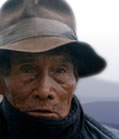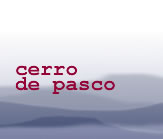 |
 |
||
 |
|||
|
RELATED THEMES development economics education identity social change social relationships OTHER LOCAL THEMES BACKGROUND |
migration
While the scale of out-migration has increased dramatically in the 1990s, migration has always been a feature of life in the area. Some moved because the land couldn't support a large family; others went in search of education or a city job. The movement wasn't all one way, either, as the growing mining industry attracted workers to Cerro de Pasco. As one narrator said, "Get this! Before not only did people leave less.but people came to La Oroya from all over the place" (Peru 16). Today, the drift is unmistakably in the direction of Lima and other cities. Mining no longer promises job security: ".very few young people work in the [mining] company these days and those that do are casual workers.. All of a sudden they don't have a job.. In my parents' time, if you started work there, it was to stay.. It's different now, it's all changed" (Peru 27). Most young people say they're leaving in search of further education and employment, although reading the testimonies it is possible to see that other factors influence such decisions. Some need to assert their independence; others wish to become part of a more "modern" world. Many older narrators seem resigned to the loss of young people, and are adamant they do not want their own children to work in the mines, or scrape a poor living from the land. But there is a sadness at the cost: families ties weaken, older people feel abandoned, and fewer people remain who could actively promote development in the rural areas. Some community members worry that the migrants will forget their cultural heritage, although others remain confident that such ties remain strong. Although urban migration clearly has a cost, at least one narrator says he has also gained from exposure to other experiences. Vicente, who has become a highly knowledgeable researcher into local culture and history, says, "My parents brought me up in the campesino way of life, tending the sheep, the alpaca and all the other animals you find here. Just as the stones live alone in countryside accompanied only by the sun and the wind, so I have lived, and I have been happy. But living with nature in this way you don't know much about progress, you don't transform your experience, you only know the daily routine - land, animals, day and night, and what else? You only work and cultivate the land like a stone.like the grass which has to grow for the animals to live" (Peru 30). quotes about migration"Many people came in the early decades attracted by the promises of the enganchadores (contractors: literally, those that "hook" people in) .. And I'm talking about thousands of workers.. The result of several decades of this is the great mixing which is so characteristic of Cerro de Pasco.. we can see the evidence of different cultures and music." "[Young people] leave to find work, they don't go for any other reason. They don't go because they hate their land.. the majority go to escape the poverty, don't they? If there were better pastures and clean water, they'd stay." "Our youths don't stay in their land. They leave and they lose their roots, their culture, this is what worries me.. The countryside's depopulated and the cities grow.. If I wanted to set up a small business there's no one to buy from me.. So the future's elsewhere." "It's more difficult for young people to stay here in their communities now, because there isn't much work. That's why they leave, to make a living, "to see what's happening" as they say, in other places.. A lot of young boys want to study as well, it's not like before.. You were satisfied being able to read and write.. Now the parents themselves want their children to study." "Because, you know, nearly 70 per cent of young people from the communities, despite all the wealth we have here, the wealth they're extracting from the [mine]. which we don't get any of. [they have to] go to Lima, to struggle in the slums, to suffer hunger and all the rest of it. This is the migration from the country to the city which is doing so much harm to our communities.. I knew this. That's why I came back." |
|